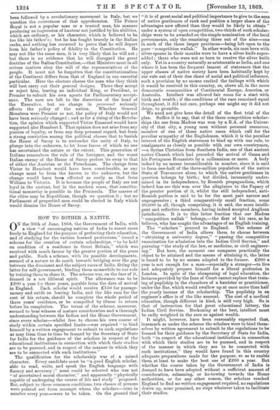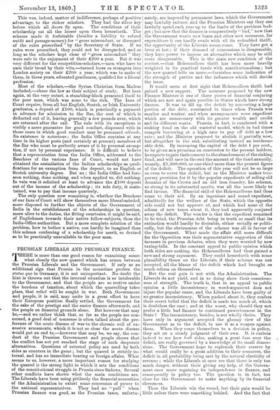HOW TO BOTHER A NAT1V.b.
ON the 30th of June, 1868, the Government of India, with a view "of encouraging natives of India to resort more freely to England for the purpose of perfecting their education, and of studying for the various learned professions," issued a scheme for the creation of certain scholarships, "to be held on condition of a residence in Great Britain," which was received with much favour by the greater portion of the press and public. Such a scheme, with its possible developments, seemed of a nature to do much towards bridging over the gap between the dominant and the subject races of India, fitting the latter for self-government, binding them meanwhile to our rule by training them to share it. The scheme was, on the face of it, framed in a not illiberal spirit. The allowance was to be £200 a year for three years, payable from the date of arrival in England. Each scholar would receive £150 for passage- money and outfit on leaving India, and the like sum for the cost of his return, should he complete the whole period of three years' residence, or be compelled by illness to return before its completion. The terms of the scheme, moreover, seemed to bear witness of mature consideration and a thorough understanding between the Indian and the Home Government, since every scholar—whilst free to choose his own course of study within certain specified limits—was required "to bind himself by a written engagement to submit to such regulations as may from time to time be framed by the Secretary of State for India for the guidance of the scholars in respect of the educational institutions in connection with which their studies are to be pursued, and in respect of the manner in which they are to be connected with such institutions."
The qualification for the scholarship was of a mixed character. Every candidate must be "a good English scholar, able to read, write, and speak the English language with fluency and accuracy ;" none could be selected who was not "of ascertained moral character," and apparently "physically capable of undergoing the course of life and study" proposed. But, subject to these common conditions, two classes of persons were pointed out from amongst whom the scholars—nine in number every year—were to be taken. On the ground that "it is of great social and political importance to give to the sons of native gentlemen of rank and position a larger share of the advantages now offered than they would be likely to obtain" under a system of open competition, two-thirds of such scholar- ships were to be awarded on the simple nomination of the local governments, only the remaining three out of the nine—one in each of the three larger provinces—being left open to the pure "competition wallah." In other words, six men born with silver spoons in their mouths were to have a silver knife super- added ; three who were not so born to receive the silver knife only. Yet in a country naturally so aristocratic as India, and one where it has been the frequent lament of statesmen that the upper classes of native society have been habitually kept by our rule out of their due share of social and political influence, such a provision by no means excited the feelings with which it would be received in this country, or, above all, in the more democratic communities of Continental Europe, America, or Australia. Intellect was allowed fair room for a start with birth and wealth ; if the conditions of the race remained equal throughout, it did not care, perhaps one might say it did not deign, to grumble.
We need not give here the detail of the first trial of the plan. Suffice it to say, that of the three competition scholar- ships the one from Madras was won by a B.A. of the Univer- sity of that city, a young man without personal resources, member of one of those native races which call for the peculiar sympathy of the Englishman, which it is the peculiar interest of the English statesman to bind up with our rule, to amalgamate as closely as possible with our own countrymen, —a Syrian Christian from Southern India, one of that ancient native Church which had preceded the arrival of Gama and his Portuguese Romanists by a millennium or more. A body indeed by no means inconsiderable in number, since it is said to form one-half of the three-million population of the native State of Travancore alone, to which the native gentleman in question belongs by birth ; but divided, incessantly under- mined in its independence, by Romish propagandism, which indeed has ere this won over the allegiance to the Papacy of the greater portion of it, whilst the still independent, anti- Romish portion is said to be for the most part narrow and unprogressive ; a third comparatively small fraction, some 40,000 in all, though comprising, it is said, the more intelli- gent and reflective members, having indeed accepted Anglican jurisdiction. It is to this latter fraction that our Madras "competition wallah" belongs,—the first of his race, as he believes, who has sought the advantages of an English training.
The " scholars " proceed to England. The scheme of the Government of India allows them to choose between "obtaining a university degree," "passing the competitive examination for admission into the Indian Civil Service," and pursuing "the study of the law, or medicine, or civil engineer- ing." But here, the moment one compares practically the object to be attained and the means of attaining it, the latter is found to be by no means adapted to the former. £200 a year is not enough for a man—especially a stranger—to live and adequately prepare himself for a liberal profession in London. In spite of the cheapening of legal education, the lectures provided by the Inns of Court cannot replace that train- ing of pupilship in the chambers of a barrister or practitioner, under the Bar, which would swallow up at once more than half the yearly income of the scholarship. The pupilship in an engineer's office is of the like amount. The cost of a medical education, though different in kind, is still very high. So is that of instruction for that great educational lottery, the Indian Civil Service. Reckoning at the best, intellect must be sadly weighted in the race as against wealth.
It might, however, have been reasonably expected that, inasmuch as under the scheme the scholars were to bind them- selves by written agreement to submit to the regulations to be framed for their guidance by the Secretary of State for India, both "in respect of theseducational institutions in connection with which their studies are to be pursued, and in respect of the manner in which they are to be connected with such institutions," they would have found in this country adequate preparations made for the purpose, so as to enable them at least to make the best use of £200 a year. But whether the course taken by the Government of India is deemed to have been adopted without a sufficient amount of consideration, salaaming, or ko-towing towards the Home authorities, or for any other reason, the scholars reached England to find no written engagement required, no regulations drawn up, none promised, no steps whatever taken to facilitate their studies. This was, indeed, matter of indifference, perhaps of positive advantage, to the richer scholars. They had the silver key before which all doors fly open. The conditions of their scholarship sat all the looser upon them henceforth. The scheme made it forfeitable (besides a liability to refund outfit and passage-money) for "gross misconduct, or disregard of the rules prescribed " by the Secretary of State. If no rules were prescribed, they could not be disregarded, and so long as the scholars kept clear of "gross misconduct" they were safe in the enjoyment of their £200 a year. But it was very different for the competition-scholars,—men who have to earn their bread by their wits,—turned loose as strangers into London society on their £200 a year, which was to make of them, in three years, educated gentlemen, qualified for a liberal profession.
Most of the scholars,—the Syrian Christian from Madras included,—chose the law as their subject of study. But here again, at the very outset, a stumbling-block presented itself to the poor man, which was none to the rich. The Inns of Court require, from all but English, Scotch, or Irish University graduates, a deposit of £100, which is practically a payment in advance for admission to the Bar, the cost of which is deducted out of it, leaving generally a few pounds over, which are returned after the call. The rule with its exceptions is visibly a mere guarantee for good conduct, dispensed with in those cases in which good conduct may be presumed aliunde. Its existence is notorious ; the India Office contains at any time in its higher posts (and certainly at present) members of the Bar who must be perfectly aware of it by personal exemp- tion, if not by personal experience. It is difficult to believe that a representation from the India Office, addressed to the Benchers of the various Inns of Court, would not have obtained the assimilation of the Indian scholarships as quali- fications for an exemption from the deposit, to an English or Scotch university degree. But no ; the India Office had fore- seen nothing, done nothing, and when applied to, did nothing. In vain was it solicited at least to advance the £100 deposit out of the income of the scholarship ; its sole duty, it main- tained, was to pay that income quarterly.
The only question now remaining is, whether the Benchers of our Inns of Court will show themselves more liberal-minded, more disposed to further the objects of the Government of India in the establishment of the scholarships in question, more alive to the duties, the fitting courtesies, it might be said, of Englishmen towards their native fellow-subjects, than the India-Office authorities. But a more complete solution of the problem, how to bother a native, can hardly be imagined than this solemn conferring of a scholarship for merit, so devised as to be practically unavailable to the poor man.



































 Previous page
Previous page